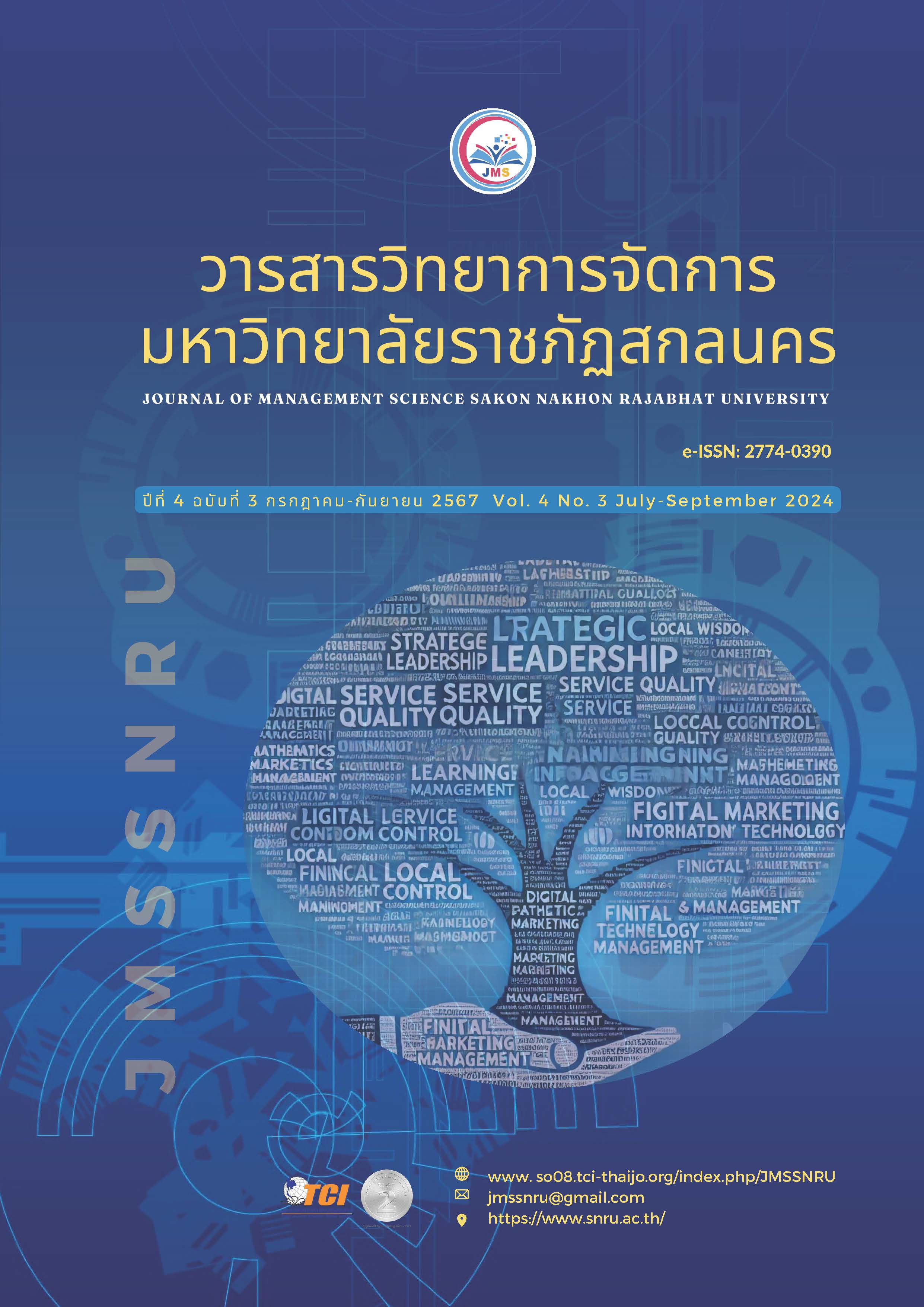SERVANT LEADERSHIP OF SCHOOL ADMINISTRATORS UNDER AMNAT CHAROEN PRIMARY EDUCATION SERVICE AREA
Keywords:
servant leadership, school administratorAbstract
The purposes of this research were to 1) study the level of servant leadership among school administrators. and 2) compare the level of servant leadership of school administrators as classified by position, level of education, and working experience, and 3) study guidelines for developing servant leadership among school administrators under the Amnat Charoen Primary Education Service Area. The samples used in the research were school administrators and 421 teachers in the Amnat Charoen primary education service area, selected by simple random sampling to determine the sample size by using the 15 percent criteria of the population. The research instruments consisted of a five-rating scale questionnaire with a confidence value of.96 and an interview form. Statistics used in data analysis were percentage, mean, standard deviation, t-test, F-test, and content analysis. The research findings were as follows: 1) School administrators overall had a high overall level of servant leadership among school administrators was at a high level. 2) A comparison of the level of servant leadership of school administrators as classified by position, level of education, and working experience had the overall aspect significantly different at the.01 level. 3) Guidelines for developing servant leadership among school administrators consist. of four aspects: 1) Servant; school administrators should have a public mind and develop themselves to have all-round knowledge to meet the needs of their colleagues. 2) Empowerment: school administrators should assign tasks according to the aptitudes and abilities of each colleague and always encourage colleagues. 3) Vision: School administrators should have a broad vision, imagine the future of possible educational institutions, and involve all sectors in planning. 4) Honor: School administrators should respect and provide opportunities for colleagues to express their opinions about their work independently.
References
เกรียงไกร ยิ่งยง. (2559) ภาวะผู้นำแบบผู้รับใช้ของผู้บริหารที่ส่งผลต่อความเป็นเลิศของโรงเรียนคาทอลิก สังกัดสังฆมณฑลนครราชสีมา. วารสารศึกษาศาสตร์, 27(1), 143-155.
ทิวากานต์ ศรีสวัสดิ์. (2558) ภาวะผู้นำแบบยั่งยืนของผู้บริหารสถานศึกษา สังกัดสำนักงานเขตพื้นที่การศึกษามัธยมศึกษา เขต 19. (2562). วารสารศึกษาศาสตรมหาวิทยาลัยขอนแก่น, 38(4), 59-64.
ธนบดี ศรีโคตร. (2562). สภาพและแนวทางการพัฒนาภาวะผู้นำแบบใฝ่บริการของผู้บริหารสถานศึกษาเอกชนสังกัดสำนักงานเขตพื้นที่การศึกษาประถมศึกษากาฬสินธุ์ เขต 2. วิทยานิพนธ์ครุศาสตรมหาบัณฑิต สาขาวิชาการบริหารจัดการการศึกษา มหาวิทยาลัยราชภัฏมหาสารคาม.
นลินี จันทร์เปล่ง. (2563). สภาพและแนวทางการพัฒนาภาวะผู้นำใฝ่บริการของผู้บริหารสถานศึกษา สังกัดสำนักงานส่งเสริมการศึกษานอกระบบและการศึกษาตามอัธยาศัย จังหวัดสุรินทร์. วิทยานิพนธ์ครุศาสตรมหาบัณฑิต สาขาวิชาการบริหารการศึกษา มหาวิทยาลัยราชภัฏบุรีรัมย์.
บุญชม ศรีสะอาด. (2560). การวิจัยเบื้องต้น. พิมพ์ครั้งที่ 10. กรุงเทพฯ: สุวีริยาสาส์น.
พิสุทธิ์ เฮมสกุล. (2560). ภาวะผู้นำแบบผู้รับใช้ของผู้บริหารสถานศึกษา โรงเรียนศรียานุสรณ์ จังหวัดจันทบุรี สังกัดสำนักงานเขตพื้นที่การศึกษามัธยมศึกษา เขต 17. วิทยานิพนธ์การศึกษามหาบัณฑิต สาขาวิชาการบริหารการศึกษา มหาวิทยาลัยบูรพา.
ไพฑูรย์ สินลารัตน์. (2561). ความเป็นผู้นำทางการศึกษา. พิมพ์ครั้งที่ 3. กรุงเทพฯ: สำนักพิมพ์แห่งจุฬาลงกรณ์มหาวิทยาลัย.
ภิญโญ ไตยสุริยธรรมา. (2553). ปัญญาญี่ปุ่น. กรุงเทพฯ: โอเพ็นบุ๊คส์.
วิศรุต ศรีประเสริฐ. (2560). ภาวะผู้นำใฝ่บริการของผู้บริหารสถานศึกษา สังกัดสำนักงานเขตพื้นที่การศึกษาประถมศึกษาเลย เขต 1. วิทยานิพนธ์ครุศาสตรมหาบัณฑิต มหาวิทยาลัยราชภัฏเลย.
สำนักงานเขตพื้นที่การศึกษาประถมศึกษาอำนาจเจริญ. (2565). แผนพัฒนาการศึกษาขั้นพื้นฐาน พ.ศ.2564-2566
สำนักงานเขตพื้นที่การศึกษาประถมศึกษาอำนาจเจริญ. สืบค้น 22 มีนาคม 2565 จาก https://web3.amnat-ed.go.th/data/3/duty-4.html#1
สำนักงานคณะกรรมการพัฒนาเศรษฐกิจและสังคมแห่งชาติ. (2560). แผนพัฒนาเศรษฐกิจและสังคมแห่งชาติ ฉบับที่12. สืบค้น 25 ตุลาคม 2565 จาก https://www.nesdc.go.th/ewt_dl_link.php?nid=6422.
อภิชาติ อนันตภักดิ์. (2558). ภาวะผู้นำแบบผู้รับใช้ของผู้บริหารโรงเรียนที่ส่งผลต่อความผูกพันต่อองค์กรของข้าราชการครูสังกัดสำนักงานเขตพื้นที่การศึกษาประถมศึกษากาฬสินธุ์ เขต 3. วิทยานิพนธ์ปริญญาดุษฎีบัณฑิต สาขาวิชาการบริหารการศึกษา มหาวิทยาลัยบูรพา.
อมรวดี สินเจริญ. (2556). รูปแบบการพัฒนาภาวะผู้นำแบบผู้ให้บริการของผู้บริหารสถานศึกษาขั้นพื้นฐาน. วิทยานิพนธ์ปรัชญาดุษฎีบัณฑิต สาขาวิชาการจัดการเพื่อการพัฒนา มหาวิทยาลัยราชภัฏราชนครินทร์.
Certo, S. C. (2006). Modern Management. Upper Saddle River, New Jersey: Pearson Prentice Hall.
Fischer, P. E. (2017). The Relationship between Teacher Perceptions of Principal Servant Leadership Behavior and Teacher Job Satisfaction in South Dakota. Doctoral Dissertation. (Education). South Dakota: The Division of Educational Administration. University of South Dakota.
Greenleaf, R. K. (2008). What is Servant Leadership. Retrieved 22 October 2022 from https://www.greenleaf.org/index.html.
Merceditas, A. (2018). Servant-leadership Traits of Educational Administrators: Emerging Profiles and Predictors. International Journal of Humanities and Social Science Research, 4(1), 36-40.
Mitterer, M. D. (2017). Servant Leadership and Its Effect on Employee Job Satisfaction and Turnover Intent. Doctoral Dissertation, Walden University, Minnesota.
Sallis, E. (2002). Total quality management in education (3rd ed). London: Kogan Page.
Shane, M. S. (2013). Servant Leadership: A quantitative exploration of the relationship between servant Leadership and employee commitment to a supervisor. Doctoral Dissertation Concordia University Texas.
Wong, P. T. P. & Davey, M. A. (2007). Best Practice in Servant Leadership. Retrieved 22 March 2022 from http://www.regent.edu/ecad/global/publications/sl_proceeding/2007/pdf/wong-davey.pdf.
Downloads
Published
How to Cite
Issue
Section
License
Copyright (c) 2024 JOURNAL OF MANAGEMENT SCIENCE SAKON NAKHON RAJABHAT UNIVERSITY

This work is licensed under a Creative Commons Attribution-NonCommercial 4.0 International License.
An article published in the Journal of Management Science. Sakon Nakhon Rajabhat University is the opinion, copyright and responsibility of the author of the work.







